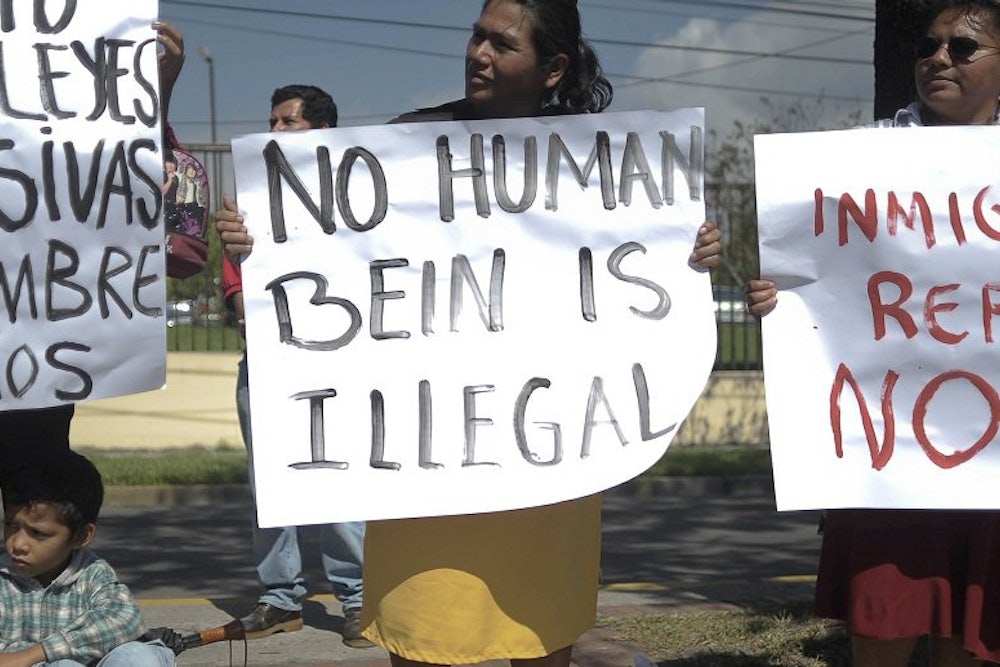There are many good reasons to support comprehensive immigration reform. There are some 11 million undocumented workers in the United States who exist in a legal and economic limbo: Their condition is worse than that of indentured servants. Proposals for emphasizing immigration of skilled workers are also welcome. And an influx of young workers is important to sustaining an aging citizenry’s social-insurance programs.
But large-scale immigration, as has occurred in the United States since 1965—and will probably expand under the new legislation—is not without its pitfalls, especially at a time of high unemployment. Historically, it has depressed the wages of native-born or naturalized workers. The Senate proposal is expected to include measures that will mitigate this effect, but only partially. It will remain an abiding problem.
Immigration depresses wages by increasing the supply of workers relative to demand. Harvard Kennedy School economist George T. Borjas, working alone or with Lawrence Katz and Richard Freeman, has produced a succession of studies over the last two decades showing that immigration hurts the wages of native-born workers. One study, published in the Quarterly Journal of Economics in November 2003, found that between 1980 and 2000 immigrants increased the labor supply of working men by 11 percent and reduced the average wage of native workers by 3.2 percent. Wages fell by 8.9 percent for workers who had not finished high school, 2.9 percent for high school graduates, and 4.9 percent for college graduates.
Business proponents of increased immigration argue that low-wage immigrant workers have taken jobs that native workers don’t want in construction, agriculture, hotels, and meatpacking plants. “Americans Won’t Do Dirty Jobs,” proclaimed a story about immigrant labor in Bloomberg BusinessWeek. That’s sometimes the case, but it’s also often because employers in those industries used immigrant labor to bid down wages so low that native workers no longer want those jobs. Until the 1980s, for instance, workers in meatpacking plants were unionized and made middle-class wages. Over the next two decades, the unions were broken and immigrants—some of whom lacked papers—replaced the native-born workers at one-third the wages.
Conversely, there are “dirty jobs” that native-born Americans have been happy to take because they pay livable wages. Many native-born Americans work as garbage collectors, who are often unionized and earn an average annual salary of $43,000. Oil-rig workers make a decent living, and so do coal miners. If businesses have their way, these jobs might also become anathema to Americans, but it won’t be because Americans are loath to get their hands dirty. It will because the jobs pay too little to support an average family.
In negotiations over the "Gang of Eight" plan, business has pressed for provisions that would allow them to import low-wage “guest workers” on temporary visas. The AFL-CIO has tried to provide safeguards that would prevent businesses from using these workers to knock down wages, such as requiring businesses to pay prevailing wages. The AFL-CIO also persuaded the Chamber of Commerce to let a new Labor Department bureau set the number of workers eligible for the program by determining whether labor shortages exist. That’s all to the good, but proposals to protect prevailing wages can be ineffective if wages in an occupation are already depressed.
Shortages, too, can be caused by an industry’s unwillingness to pay living wages. As Adam Davidson reported last fall, an alleged shortage of machinists in Milwaukee was largely due to the fact that the plant was offering wages one-third of those that unionized machinists receive. (Similar questions can be raised about the Senate proposal to increase visas significantly for H1-B technical workers. These proposals assume a shortage of American engineers that the Institute of Electrical and Electronics Engineers disputes.)
And the main point remains: The overall effect of the reforms—which would establish a new labor status for most of the undocumented workers and speed the grant of green cards to a backlog of applicants—will inevitably increase the supply of labor at a time when many Americans are unemployed. Of course, the 11 million undocumented workers are already here, and will no longer be subject to the most egregious kind of exploitation, but they will also no longer be segregated into specialized parts of the labor force and will instead be thrust into the mainstream labor market, where they will compete with native-born workers.
If Congress wanted to limit whatever damage increased immigration could do to low-wage workers, it could dramatically boost the minimum wage. Congress could also subsidize social spending in cities and states that will now have to accommodate (rather than ignore or stigmatize) undocumented workers. That would also create jobs for both immigrants and native-born Americans to fill. Republicans probably will not agree to such proposals. So it’s fair to say that for many American workers, including Hispanics, comprehensive immigration reform will be a mixed blessing. For American businesses hungry for higher profit margins, though, it will be an outright blessing.
